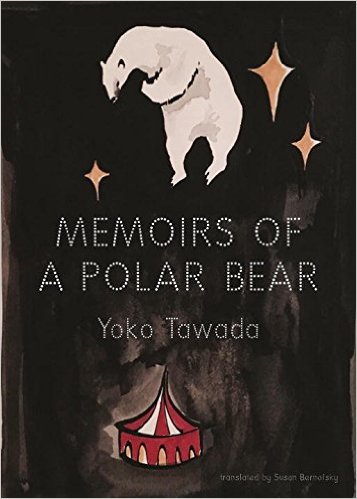

After a brief career as a circus performer in the Soviet Union, she branches out into writing her memoir providing a space for Tawada to play with elements of political satire and cultural commentary.

This polar bear can speak and write, and seems to live on the outskirts of the human world. The novel opens from the perspective of Knut’s unnamed grandmother, set around the end of WW2, it has a fairy-tale quality that draws on Tawada’s interest in writers like Kafka and E.T.A. I found the idea of Knut having a family history very appealing, usually animal’s ancestors are only considered relevant when they relate to their worth as a commodity – pedigree pets for instance – just another way of asserting their value as objects, whereas Tawada uses Knut’s lineage to do precisely the opposite, to demonstrate his selfhood, his reality as an animal with consciousness, emotions, and individual needs, part of Tawada’s overall rejection of, and critique of, the speciesism that’s regrettably still rife in our human-dominated societies. Her novel’s in three sections: the first deals with Knut’s nameless grandmother, the second his mother Tosca and finally Knut. Yoko Tawada imagines a history and a lineage leading up to Knut’s birth. Yoko Tawada's novel's inspired by the real-life Knut, a polar bear displayed in a Berlin Zoo, who became a brief sensation when he was introduced to the public as a cub in 2006. Tawada received the Adelbert von Chamisso Prize in 1996, a German award to foreign writers in recognition of their contribution to German culture, and the Goethe Medal in 2005. Her Suspect on the Night Train won the Tanizaki Prize and Ito Sei Literary Prize in 2003.

In 1999 she became writer-in-residence at the Massachusetts Institute of Technology for four months. Tawada's Missing Heels received the Gunzo Prize for New Writers in 1991, and The Bridegroom Was a Dog received the Akutagawa Prize in 1993. In 1987 she published Nur da wo du bist da ist nichts-Anata no iru tokoro dake nani mo nai (A Void Only Where You Are), a collection of poems in a German and Japanese bilingual edition. She received her doctorate in German literature at the University of Zurich. Tawada was born in Tokyo, received her undergraduate education at Waseda University in 1982 with a major in Russian literature, then studied at Hamburg University where she received a master's degree in contemporary German literature. Yōko Tawada ( 多和田葉子 Tawada Yōko, born March 23, 1960) is a Japanese writer currently living in Berlin, Germany.


 0 kommentar(er)
0 kommentar(er)
